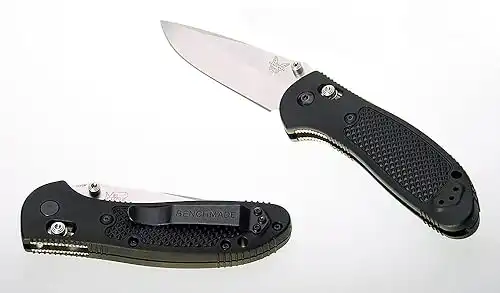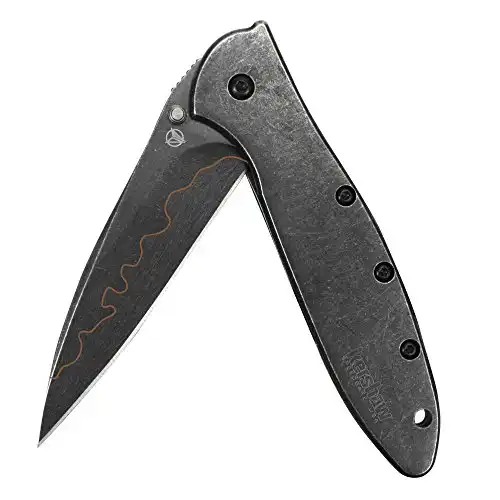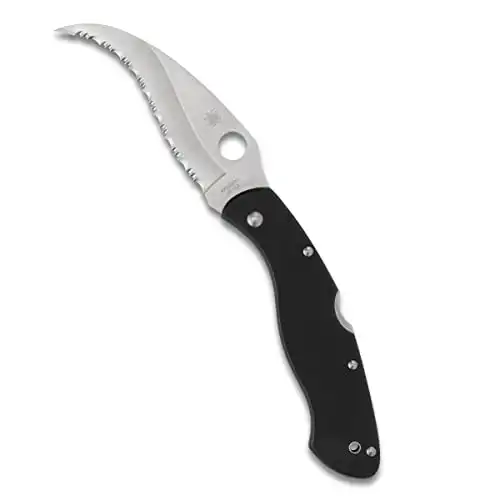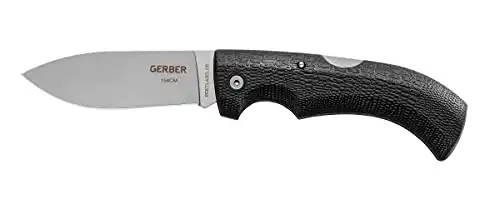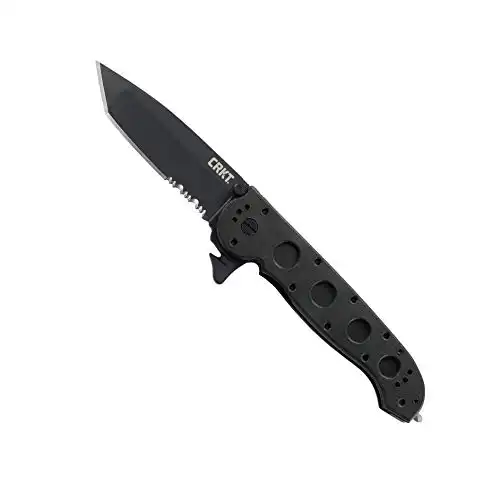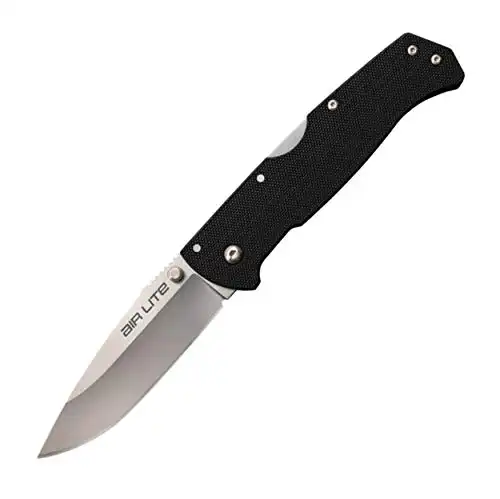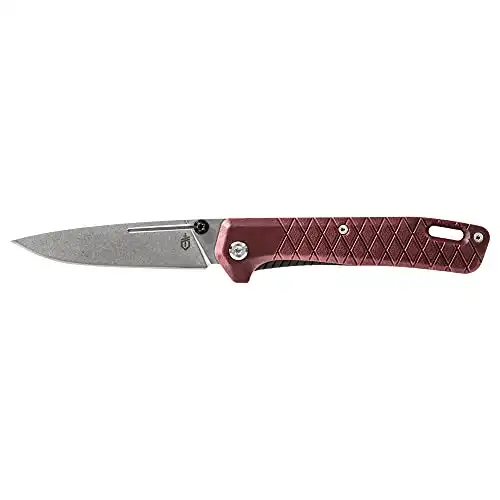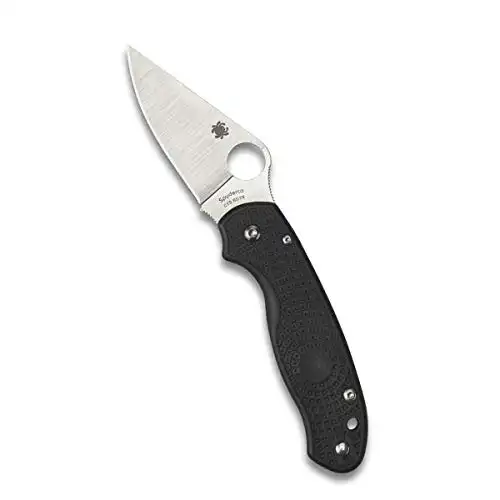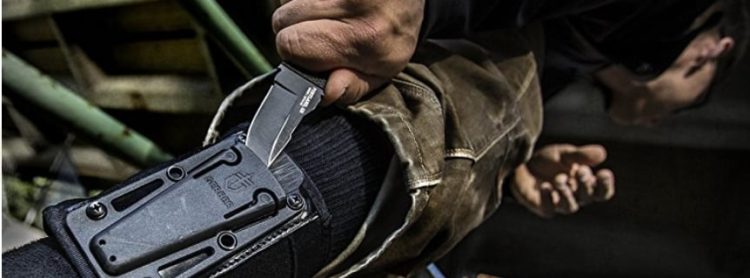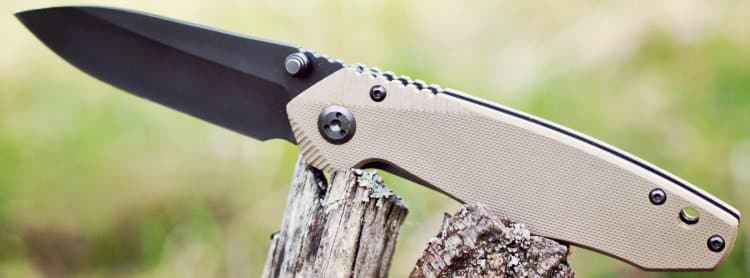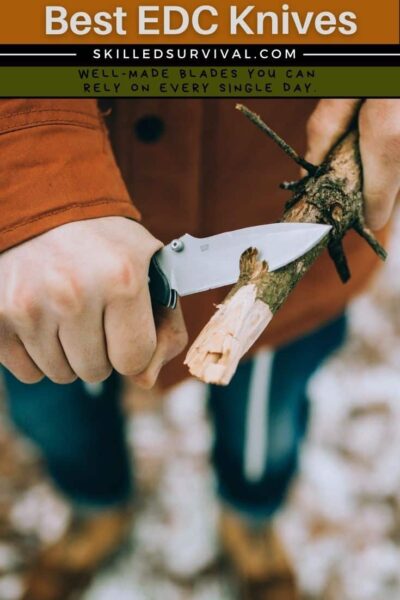
Because EDC knives are like the Swiss Army knives of the tool world—they do it all!
Cutting, chopping, slicing, stabbing, whittling, carving… you name it. And no, it’s not just for dramatic action movie scenes. These skills come in handy for everyday tasks like:
- Self-defense (because sometimes, life just isn’t giving you a break)
- Cooking prep (how else are you going to chop veggies and feel like a culinary ninja?)
- General utility (like opening that one box that’s clearly made of steel)
- Shelter building (you know, for when your dream of a cozy cabin turns into reality)
That’s why you should have an Everyday Carry (EDC) blade with you at all times. Because when the unexpected happens, a knife in your pocket is like a trusty sidekick—always ready for action.
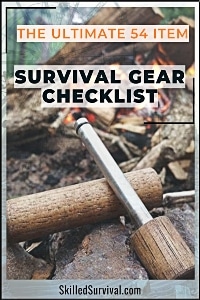
Want a free 54 item survival gear checklist?
Enter your email below to instantly download this Complete Checklist PDF. No purchase necessary. 👇 👇Best Everyday Carry Knives On The Market Today
These are best, well-made blades you can rely on every single day:
Benchmade knives are some of the best in the world. They are so renowned for their quality that the US military uses them as the standard-issue army knife.
I always carry this exact blade in my pocket, and it's the best knife I've ever owned.
The thick stainless steel blade folds nicely into a highly durable one. Plus, it has an extremely lightweight handle molded in the “griptilian” pattern.
The weight is perfect, and the balance of these knives is impeccable. You cannot go wrong with Benchmade, and this is one of their most popular blades.
The best part about Benchmade knives is the lifetime warranty they come with.
If your Benchmade blade fails or malfunctions, you can return the knife with no questions asked.
They'll work with you to replace it.
↓ Benchmade Griptilian Field Test
Kershaw makes this sleek little EDC knife has a 3” blade, a D2 steel edge, and a very low-profile, reversible pocket clip.
The blade features SpeedSafe open-assist. This flicks the blade open very quickly, with just the touch of a button.
The frame lock mechanism is located at the bottom of the handle and fixes the blade in place when engaged.
Perhaps the best part about this Kershaw blade is its slim design.
Even when folded into the handle, the knife is extremely slender, hiding easily in a pocket or on a belt.
↓ The Kershaw Leek Pocketknife Review
There are few EDC blades out there as wicked-looking as this knife. Its curved blade is serrated and developed for elite undercover law-enforcement agents.
Much like a handgun, this knife is designed for self-defense.
A mid-positioned back-lock prevents accidental closures/openings. Spyderco is a Colorado company that's been making top-of-the-line knives for years.
Their products are some of the best in the blade business, and their price points reflect that. They are expensive.
But you're paying for extremely high quality and a lifetime guarantee.
↓ Knife Review: Spyderco Civilian G-10
Gerber is one of the oldest and most reliable knife-making companies in America. Making the Gerber Gator a highly reliable survival tool.
It's basic, it's simple, it's versatile, it's durable, and it's authentic.
The handle is covered in a ballistic nylon grip molded to resemble gator skin. And the thick, stainless steel blade is edged to perfection.
There are a few better options if you're looking for an affordable, reliable EDC folder.
↓ Truly Outdoors Focused! Gerber Gator Premium Knives
CRKT makes some of the most affordable knives of the best quality. They are the perfect balance between affordability and excellence.
This knife is a perfect example of that.
The handle is made from high-durability textured glass-filled nylon scales. The stainless steel blade features a seatbelt cutter on the Carson Flipper.
It also includes a tungsten window smasher on the butt.
The flipper can be pressed for an automatic single-hand opening of the tanto-shaped blade.
This knife is made for function, not for fashion, but that does not mean it doesn’t look good.
There are several different handle color options available to choose from.
↓ CRKT M16 Series Redesigned: CRKT Nailed It!
↓ EDC Greatness: Cold Steel Air Light
The Gerber Zilch is a compact, lightweight folding knife perfect for everyday carry.
The blade is under 2 inches and is made of 7Cr17MoV stainless steel, which is a steel that's easy to sharpen. And the blade includes a thumb stud for easy opening and a liner lock to keep it securely in place.
The aluminum handle has a textured pattern for a secure grip. And includes a lanyard hole and a pocket clip that can be positioned for left or right-handed carry.
The Gerber Zilch is incredibly lightweight, weighing in at just 0.7 ounces. When closed, it measures just 2.7 inches long and 0.6 inches wide, making it one of the smallest folding knives on the market.
↓ Gerber Zilch Wrecks Budget EDC Norms
- Weight: 2.4 oz
- Blade Length: 3"
- Blade Steel: CTS-BD1N
- Locking Mechanism: Compression
The Spyderco Para 3 Lightweight replaces the standard thumb stud with a thumb HOLE on the back of the blade!
This design makes the blade broader and more massive.
This size difference means it's much easier to open when you don't have a thumb stud (cold, wet hands, for example).
That’s why it’s so impressive that despite the extra steel used in making the thumb hole, the Para 3 still comes in at just 2.4 oz!
This goes to show how much Spyderco uses lightweight materials throughout the build.
The superior quality steel offers excellent edge retention and sharpens well.
Some users noted the overall balance feels off because of the extra mass in the blade and less in the handle.
This is not a critical flaw, but something to consider if balance counts more than weight savings.
I like the lightweight wire pocket clip.
But it doesn't feel as securely mounted in the handle as I would like.
PROS
- Lightweight
- Easy-open ambidextrously with cold hands
CONS
- Balance and weight distribution are off
- Pocket clip mounts feel insecure
↓ Spyderco Para 3
Why You Should Carry One
When you’ve got a pocket knife, you’ve got one of the most ancient survival tools at your side. But these days, EDC knives are more compact and lighter than ever. And have better edge retention than knives from the past.
Better than the fixed blade hunks of iron our ancestors lugged around. But with so many knives on the market today.
Trying to find the “best” one becomes an overwhelming endeavor. And buyers, beware!
Not all are created equal. Some are designed and built to higher standards of quality than others. Some are incredible survival resources, while others are barely useful for opening packages.
Don’t waste your money on a product that will fail you when you need it most.
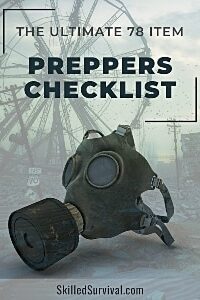
Want a free 78 item prepper checklist?
Enter your email below to instantly download this Complete Checklist PDF. No purchase necessary. 👇 👇Types Of Knives For EDC
Many knives are designed specifically for survival purposes. While others are made for general application. So you must know ahead of time what type you want for your EDC.
Folding Knives
The most popular type of EDC blade is the folder. Why? Because it’s the best small EDC knife you can carry. When tucked away, pocket knives fold in half.
This feature reduces their overall length and size. The only major downside it cannot take as much abuse as a full tang fixed blade survival knife. Don’t try chopping or batoning with a folder.
If you do, you’ll destroy the knife at its weakest point (the hinge). So for most everyday carry uses, a folder is hard to beat. But don’t mistake a folder for a true survival knife.
Fixed Blade Knives
Unlike a folder, a fixed blade knife, the blade is fixed.
- There are no joints or hinges.
- No unfolding or flipping it open.
So a fixed blade full, tang knife can handle more abuse. Think of it as a mini survival knife.
Now there are different ways to carry a smaller fixed-bladed EDC knife. So let’s cover each of those options next.
Neck Knife Carry
A neck knife is typically a shorter fixed-blade knife that fits in a slim sheath with a cord. And then the cord goes around your neck. The better ones have a thin profile when in their sheath.
It also should be lightweight, so it doesn’t become annoying or uncomfortable to carry. With a neck knife, you grab the knife’s handle and pull it down to release it from its sheath.
If you prefer a neck knife for EDC, check out this article: 11 Best Neck Knives That Will Make You Sneaky Prepared
Boot Knife Carry
A boot knife is a small fixed-blade knife worn in a sheath that wraps around your ankle or calf. Hence, the term “boot knife.”
You don’t necessarily have to be wearing boots though. Long pants also keep the knife concealed, even if you are wearing shoes. However, you don’t want to carry a boot knife around town in a pair of shorts.
If you’re interested a wearing a boot knife for EDC, check out this article: Best Boot Knives & The Best Way To Wear Them
Best EDC Knife Features To Look For
As with any tool, there are a few basic components and characteristics you’ll want to look for. But everyone’s needs and preferences will be different.
And personal preference plays a BIG role in choosing the right one for you. For example:
- Weight
- Handle Shape
- Blade Size
- Carry Location
- Blade Shape
- Handle Material
- Etc.
One specific knife might feel great for you and awkward to the next guy. That’s normal.
With this in mind, here’s a list of essential features the best ones have in common:
Compact
Folding knives are exceptional in this regard. For millennia knives were made with fixed blades that required sheathes for safety. These had to be strapped to a belt or pack. But in the 1900s, when folding knives hit the scene, it changed the game.
Suddenly, you could put one in your pocket, discretely tucked away at the ready. Some of the best EDC knives are folders.
They’ve become popular for everyday carry for a reason. But short fixed blades are compact as well.
Ergonomic Handle
The handle is a critical part of the knife. It’s part of the knife you’ll be most intimate with. So make sure it feels great in your hand. It should sit comfortably, and easy to grip.
Try another size if it feels too small or large. Don’t compromise here. A knife that fits perfectly in your hand will help build a bond.
It should feel like it was made for you.
Locking mechanism (folders only)
A button or a sliding clip should be on the handle to lock your blade in place. I’ve seen people maimed by stray blades accidentally opening and closing in their pockets.
For your safety, you must lock the blade in place when it’s folded and extended. Fixed-blade knives don’t have or need locking mechanisms.
You could also look for an axis lock – which one of the safest options available nowadays.
↓ AXIS Lock Explained
Low-Riding Pocket Clip (folders only)
The knife clip is every bit as important as the folding mechanism or the blade lock. The clip makes it insanely easy to fasten a knife to the outside of a pack or into a pocket.
Clips are essential for everyday carry. But some of them can be a pain.
Some are large and bulky and mostly get in the way. Finding a knife with a nice, low-profile clip is a huge step toward finding the perfect solution.
Good Sheath (mainly fixed blade knives)
With neck, boot, and belt knife carry options; you need to spend as much time researching the sheath. The sheath will make all the difference.
You want a compact sheath with a small profile. It needs to have enough material and size to do its job. It also should feel snug when the blade is seated.
Lightweight and Durable
There are some incredibly cool-looking folding blade knives. For example:
- I’ve seen some made out of hardwood and inlaid with turquoise.
- Or made out of mammoth bone, with their blades forged from Toledo blade steel.
While these tools look cool, they are also more cumbersome than necessary.
A knife made out of durable, lightweight materials will serve you better. Plus, it’ll weigh on you less throughout your day-to-day activities.
There’s a reason they don’t make bejeweled screwdrivers and golden-plated hammers. Tools are meant to be used, beaten up, and worn down… Not bedazzled!
If they’re made from precious materials, it compromises the instrument’s utility.
Legal Blade Length
The laws on “how long a knife blade can be” change from state to state. Some areas only allow knives of specific lengths to be carried on your person legally.
While in other places, don’t allow people to carry knives at all.
Researching your state’s knife laws is important before buying. Otherwise it could get confiscated. Or worse, you might get a ticket for carrying it.
If your knife is illegal in your state, consider carrying a different self-defense weapon instead.
Corrosion Resistance
Of course, you want this blade to last a lifetime. So you may want one with corrosion resistance properties.
- This could mean picking a stainless steel blade vs carbon steel.
- It could also mean choosing a handle that’s a composite vs wood.
Multi Tools
Some folks want to carry more utility than just a blade. I’m talking about plyers, screwdrivers, files, scissors, etc. That’s where a good multi-tools comes in.
For an article all about multi-tools check out this article: 7 Best Survival Multitools For Everyday Carry & Survival

Want a free 54 item survival gear checklist?
Enter your email below to instantly download this Complete Checklist PDF. No purchase necessary. 👇 👇How To Care For Your Knife
All knives need a little TLC from time to time.
Maintenance and upkeep are necessary if you want them to continue to perform at their best. It’s nothing complicated. All it takes is the occasional sharpening and cleaning.
Doing so will make a quality knife last several lifetimes (or longer).
↓ How to Clean and Maintain Your EDC Folder
Cleaning
Most EDC knives are made of stainless steel. This makes cleaning them extremely easy.
First, scrape off any crud or grime from the blade (use a surface cleaner to remove stubborn stains). With a damp rag, you can wipe down the blade and handle. And with a Q-tip, you can clean out all the nooks and crannies.
It’s also a good idea to oil your knife occasionally. To keep the hinge swinging like it is brand new. Gun oil works best for this. Applied to a Q-tip, gently rubbed on the hinge point (but you can also use WD-40).
Don’t go overboard, though!
A little oil goes a long way. Be sure to wipe off any excess oil.
Sharpening
Many knifemakers will sharpen your knife for you. If your Kershaw, Spyderco, or Benchmade blade is getting dull, send it back to the manufacturer. Let them use their specialized equipment to sharpen it correctly.
Of course, this means parting ways with your knife for several weeks. You can also sharpen a knife yourself, using a multitude of knife sharpeners.
Sharpen your blade every once in a while. Ensure you stay on top of it; a dull knife is more dangerous than a sharp one!
The Final Word
Buying an EDC knife is important to becoming a prepared survivalist.
It’s a tool that serves many purposes. And it fits comfortably inside pants pockets, under a shirt, in a boot, or on a belt. But finding the right one can be difficult.
Do your research, and shop around. Look for one that fits into your price range. Find one that feels like the perfect fit for your body, your preferences, and your survival needs.

Prepare, Adapt & Overcome,
P.s. - I just found out 2 out of 3 Americans don’t feel prepared for a 3 day disaster!!!
I guess this goes to show how modern society continues to embrace ‘living a fragile life.’ What’s crazy is… it’s so easy to fix.
To make sure YOU have the basics, watch our FREE training on “10 Simple Steps To Basic Preparedness” that shows you HOW.
Nothing crazy here… this isn’t doomsday prepping... just the basics every responsible adult should have before a disaster strikes.Why You Can Trust Skilled Survival...
Go here now to review a full breakdown of:
- Who We Are
- Our Credentials
- Our Mission
- & Product Recommendations...
Here are a few highlights of our teams credentials & certifications:
- Certified Member of a Mountain Search & Rescue Organization
- Plant Emergency & Safety Leader for a Major Food Manufacturer
- Member of the 10TH Mountain Division Hut Association
- Certifications: Avalanche 1, WFR, CPR
- Official Gear Tester for Numerous Outdoor Gear Companies
- Countless Multiday Backpacking trips into Remote Wilderness
- Bachelor's Degree In Mechanical Engineering
- Bachelor's Degree In Civil Engineering
- Bachelor's Degree In Biomedical Engineering
"It takes 20 years to build a reputation and five minutes to ruin it." - Warren Buffett
We're fully aware that trust is NOT something you GET but is EARNED.
And we'll continue to earn YOUR trust through our forthright and honest approach with each new Blog Post, Guide & Product we create...
P.s - I just took this FREE 60-second 'Readiness Score Quiz'👇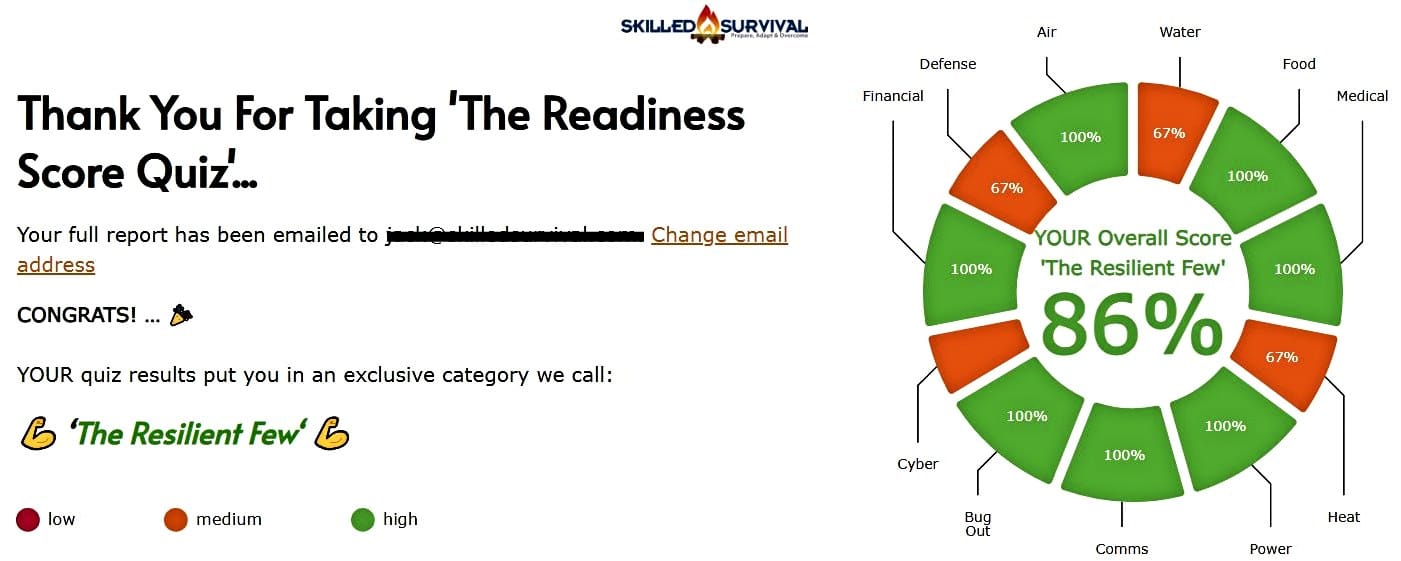
AND... I've still got a few gaps in my preps...🤔 But at least, I'm not part of 'The Fragile Masses'. 👍 Find out where YOU stand by answering a few questions...
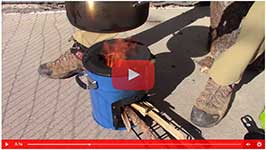
Recommended Reading
LifeStraw Review: An Expert Puts It To The Ultimate Test
LifeStraw Review - with no moving parts, chemical additions, or batteries, it provides a lightweight, compact filter to treat up to 4000L...
Best Survival Bow: 16 Surprising Reasons YOU Should Get One
A survival bow is one of the most underappreciated weapons I think EVERYONE should own. Here are 16 reasons why YOU should get one today.
Best Survival Hatchets: Tough Enough To Outlast The Wild
Not all hatchets are created equal. A quality survival hatchet can do tasks even a survival knife cannot. Here's the one I carry in my pack.
Best Survival Radios: Why You Must Secure One (before SHTF)
Be the ONE who knows what the hell is going on after SHTF. Here's how to set yourself up with a reliable survival radio in a future disaster.
Best EDC Flashlight: Simple, Small, Compact & Super Bright
The best edc flashlight is durable, bright, compact and worth carrying! In this guide, we review the best one to make your search easy.
11 Proven DIY Survival Gear Projects ANYONE Can Follow
Building DIY survival gear doesn't NEED to be complicated to be effective. Here are the 11 best projects you can finish in just a few hours.
